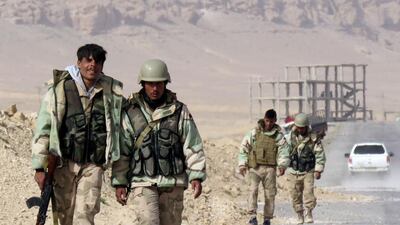DAMASCUS // ISIL suffered a double setback on Friday as the Pentagon confirmed the extremist group’s second-in-command was killed in a US raid and Syrian government forces recaptured parts of the ancient city of Palmyra.
US secretary of defence Ashton Carter said the death this week of Abd ar-Rahman Mustafa Al Qaduli, described as ISIL’s number two, would hamper the ability of the extremists to conduct operations in Iraq, Syria and elsewhere.
He said Washington was “systematically eliminating” ISIL’s cabinet, referring also to the killing earlier this month of “Omar the Chechen”, who Washington said was effectively the group’s defence minister.
“The momentum of this campaign is now clearly on our side,” he said.
The seizure by Russian-backed Syrian troops of areas of Palmyra including the hilltop citadel came nearly a year after ISIL overran the Unesco world heritage site, most of which remains in the extremists’ hands.
The regime’s gains came after US secretary of state John Kerry and Russia’s president Vladimir Putin agreed to intensify the drive for a political settlement in Syria.
Syrian state television said loyalist troops has seized the Palmyra citadel “after inflicting many losses in the ranks of the terrorist group Daesh”.
It said the army had also cut off the main Palmyra-Deir Ezzour highway leading to the border with Iraq, where Baghdad launched an offensive to retake the ISIL-held city of Mosul on Friday.
Earlier, Syria’s antiquities chief Maamoun Abdelkarim said the army had also made gains elsewhere in Palmyra.
“In the south-west, the army has liberated the district of hotels and restaurants as well as the Valley of the Tombs,” he said.
The Syrian Observatory for Human Rights monitoring group said Russian and Syrian warplanes were continuing air strikes in the area.
Mr Abdelkarim said the army was 600 metres from the site of the Temple of Bel, which ISIL destroyed in September, “but it is advancing slowly because of mines and above all to protect the city, which is an ancient treasure”.
Palmyra’s full recapture would be a major strategic and symbolic victory for president Bashar Al Assad, since whoever holds it also controls the vast desert extending from central Syria to the Iraqi border.
ISIL also faces mounting pressure in neighbouring Iraq where the army said on Thursday it had launched a long-awaited offensive to retake the second city of Mosul, a key ISil hub since a lightning assault in June 2014.
Iraqi forces cleared roadside bombs and booby traps on Friday in villages south of Mosul from which they ousted militants a day earlier, officials said.
The army has described the operation in which these villages were retaken as the first phase of an offensive to recapture Nineveh province and its capital Mosul.
Experts have warned that any battle to retake the city would be difficult, given the significant number of extremists and civilians and the time ISIl has had to prepare defences.
The gains in Palmyra come as the latest round of peace talks aimed at ending Syria’s five-year war, which has left more than 270,000 people dead, were adjourned after two weeks.
Mr Kerry and Mr Putin, who back opposing sides in Syria’s war, agreed at a rare meeting in Moscow to push for a political settlement, but the future of Mr Al Assad remains a sticking point.
Unless Mr Al Assad agrees to step down, there are concerns that the Syrian opposition could drop out of peace negotiations, which UN envoy Staffan de Mistura said he was aiming to restart on April 9.
The focus of Syria’s war appears to have shifted to the battle against ISIL in Palmyra, nearly a month after a ceasefire between the army and non-extremist rebels brokered by the United States and Russia came into force.
Global concern over the extremist threat was further heightened this week by a deadly attack in Brussels that was claimed by ISIL.
In ISIL’s de facto capital Raqqa in northern Syria, “jihadists have been celebrating the Brussels attack all week,” Observatory director Rami Abdel Rahman said.
The group’s top religious figure in the city, Abu Ali Al Sharii, led the Friday prayer with a pledge to commit more violence.
“We vow new operations by jihadists in the West,” he said, according to the Observatory.
* Agence France-Presse

